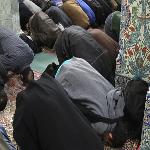18 March 2010

Worshipers at Washington's Islamic Cultural Center
U.S. President Barack Obama has again postponed his trip to Indonesia because of pressing issues in the U.S.? The trip is part of his ongoing effort to reach out to Muslims worldwide. Last year, he gave a speech in Cairo that was considered a landmark in the effort to bridge differences between Islam and the West. Many Muslims believe he should do more
Frictions between Islam and the West often flare up - like when when a Danish newspaper published cartoons of the Prophet Mohammed - or when Muslim girls in Europe went to school wearing veils, or new minarets in Switzerland were banned.
The wars in Iraq and Afghanistan have also complicated America's relationship with the Islamic world.
Last year, President Obama went to Cairo hoping to change that. He extended the traditional Muslim greeting, and said while he is a Christian, his father's family includes generations of Muslims.? "I've come here to Cairo to seek a new beginning, between the United States and Muslims around the world," he said.
He declared that the U.S. is not at war with Islam, but is against violent extremists who exploit the tensions between Islam and the West.
Those tensions go all the way back to the Crusades - when Christian armies invaded the Holy Land.
But there have also been times of harmony like in medieval Spain. ?
Since the September 11 attacks, attempts to bridge the differences between the two civilizations have acquired a new urgency.
Recently, Sunni and Shi'ite clerics met with Christian counterparts at the National Cathedral in Washington.
Professor Ahmad El Tayeb of Al Azhar University in Cairo said the President's speech there was a landmark.? "I was there, and I admired that speech very much. But we are still waiting to see practical results," he said.
He says the U.S. shouldn't side with Israel or fight wars in Muslim countries.
Fouad Ajami heads the Middle East Studies program at the School of Advanced International Studies in Washington. "I think in many ways some of the issues Mr. Obama raised were legitimate ones. But he overpromised, he overpromised, and eventually he was going to come down to earth," he said.
Ajami says there's only so much an American president? can do. He says the conflict is actually within Islam. "In fact what has happened over the last generation is that Islam has been hijacked for all practical purposes by the most extreme elements in the Muslim world. And you have these radical preachers in Yemen, you have these radical preachers in south Asia, you have these radical preachers in Pakistan. And I think that the Muslims finally awakened to the fact that their faith is in danger, that their faith has become in many ways synonymous with radicalism," he said.
The president's task is not easy. At home, critics accuse him of apologizing for America.
Still, Mr. Obama holds up his own country as a place where people of all religions can thrive.? "And that includes nearly 7 million American Muslims in our country today who, by the way, enjoy incomes and educational levels that are higher than the American average," he said.
Several hundred Muslims worship every Friday at the Islamic Cultural Center in Washington, D.C.
Some are diplomats from nearby embassies. But many are citizens who have lived in America for decades. They still believe in Mr. Obama's message. "People think he's going to do the thing in a snap, he cannot do that," said Mohamed Adje, a worshiper.
.
Another worshiper, Mohammed Abdul Meguid Saleh, added "No way can push everything fast. Everything is going to be okay. It's not easy, it take time to get everything together."
When the president travels to Indonesia, he'll have another opportunity to reach out to the Muslim world. It's a place that is personal for him? - he lived there as a child. So at the very least, he can once again present himself as a symbol of hope for reconciliation between Islam and the West.